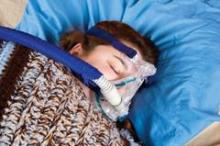Treatment with continuous positive airway pressure leads to significantly better diabetes and blood pressure control at 5 years among diabetics with obstructive sleep apnea, according to results from a case-control study in 300 patients.
The researchers, led by Julian F. Guest, Ph.D., of Catalyst Health Economics Consultants in Middlesex, England, and King’s College London, examined records from 150 patients with type 2 diabetes and obstructive sleep apnea (OSA) from a national health database who had been treated with continuous positive airway pressure (CPAP) for up to 5 consecutive years, of whom 139 remained on CPAP at year 5, and compared these with 150 controls with both OSA and type 2 diabetes who were not on CPAP.
Dr. Guest and his colleagues sought to discern not only clinical differences between the study groups but also differences in cost effectiveness, and found advantages with CPAP for both. CPAP-treated patients had better-controlled diabetes than did the control patients at 5 years, with hemoglobin A1c of 8.2% in the CPAP group, compared with 12.1% among controls, a significant difference (Diabetes Care 2014 [doi:10.2337/dc13-2539]).
CPAP was also seen increasing patients’ health status significantly, by 0.27 quality-adjusted life years/patient over the 5-year period, while diminishing costs incurred. In both CPAP users and control patients, blood pressure declined over the study period, and patients’ blood pressure in the CPAP-treated group was significantly lower than that of control patients by year 5.
One unexplained finding was that more CPAP-treated than control patients had a diagnosis of cardiac arrhythmias; Dr. Guest and his colleagues suggested that this might be because patients on CPAP may have had more severe OSA at baseline, though this information was not available.
The investigators described their findings as compelling but cautioned that analyses of clinical outcomes "were based on clinicians’ entries into their patients’ records and inevitably subject to a certain amount of imprecision and lack of detail." Moreover, they wrote, the information collected in the database used was done so "for clinical care purposes and not for research."
The study was funded by a grant from ResMed, a maker of CPAP devices, with no other conflicts of interest reported.



